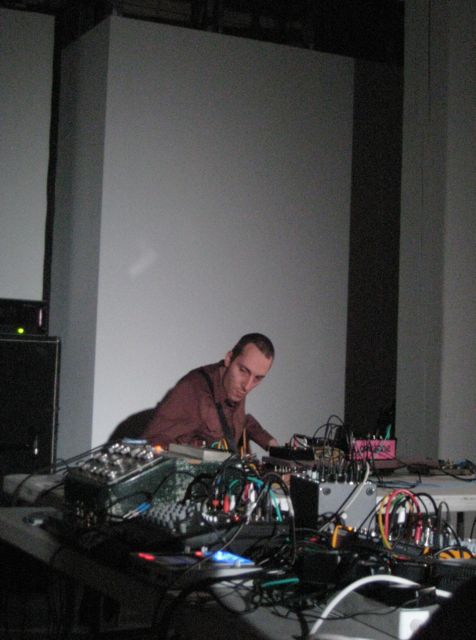send + receive, Oct. 25 2008
For the closing night of the festival, send + receive curated a devastatingly beautiful - and loud - line-up. First up was Montreal’s Alexandre St-Onge, whose set consisted of laptop treated six-string bass and bizarre vocals, half falsetto and half sinus clearing hoarks. While I’d like to think I am pretty open minded when it comes to music, I must have missed the point of St-Onge’s set. It just didn’t do anything for me. St-Onge’s set also seemed to be somewhat out of place amongst the all-analog drones on display that night. Plus, I found it hard to focus on anything except the next artist, Australia’s guitar drone merchant, Oren Ambarchi.
One aspect that makes Ambarchi’s music so beautiful and captivating is that, unlike most experimental artists, he doesn’t use laptops to generate or process sounds. Instead, Ambarchi keeps it all analog, using guitar as the main signal source, two giant bass amps and a string of battered guitar pedals to shape his sounds.
The set began with a barely audible bass tone. You could almost feel it before hearing it. The audience, surrounded by speakers, sat in dead silence. At an almost glacial pace, Ambarchi let beautiful pure bass frequencies hang in the air, only to be interrupted by the oscillation of another note before they fell away into silence. You could actually hear the floor boards of the Urban Shaman Gallery vibrating because of the sheer volume and power of Ambarchi’s music. Slowly, the tones became sinister and louder. Several times throughout his set, I felt a strange buzzing sensation in my skull - it was as if the tones were coming right out of my brain instead of from a man seated behind a table of effects. Absolutely hypnotic. After about 20 minutes of drone-bliss, Ambarchi became more aggressive. A series of analog bloops and bleeps ricocheted around the walls of the Urban Shaman gallery, while the gentle drones became an inescapable, all-encompassing wall of oscillating bass notes and discordant analog-hum. At one point, all of the lights in the room went out, leaving the audience in the suffocating darkness of Ambarchi’s tones. The blackout didn’t seem intentional, so I’d like to think that Ambarchi’s tones caused the lights to go out somehow. After the cacophany subsided, Ambarchi brought things down just as he started them, with quiet bass frequencies, interspersed with clicks and pops - perhaps a result of the analog circuitry being overloaded, or maybe it was the speakers themselves popping from the intensity of the frequencies at work. As the crackling circuits began to swirl amidst the slithering bass tones, and as it became apparent that Ambarchi’s set was coming to a close, a massive squall of low-end feedback came out of nowhere, blotting out every sound in the room. Ambarchi put down his guitar, and unplugged both input jacks from the bass amps. To no avail, the hum continued. Finally, he reached down an ripped the power cord from the wall, killing the power to the amplifier and leaving the audience in a deafening silence.
I asked Ambarchi after his set if that was intentional, and he told me that his amps “Just started humming.” At first he thought it was his equipment, so he shut off all his pedals and p.a. and eventually had to unplug his amplifiers to make it stop. Though unintentional, the abrupt ending was fitting in a way. Ambarchi’s set was at once beautiful and visceral, and the poetry of Ambarchi having to stop the sound in such a physical way was not lost on the audience. Thus is the excitement of working only with analog equipment: you never know what will happen.
To finish things up was German/Finnish duo Angel, featuring Dirk Dresselhaus and half of Pan Sonic, Ilpo Vaisanen. Standing at a table of mysterious gear, all clusters of wires and flashing lights, Vaisanen and Dresselhaus exorcised beautiful and terrifying sounds from their instruments. Their set began with field recordings: buzzing files, bird calls, howling winds. At the flick of some hay-wired switch, the room was drowned in massive analog drones and shimmering feedback. Angel played for close to an hour and kept things very noisy, though never grating. There was a sense of tranquility buried amidst the almost-industrial whir, and Angel exploited its presence, giving the audience a moment to catch their breath before pulling them back into the deafening sonic murk.

Angel

Oren Ambarchi
all photos by c.faris
